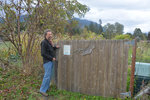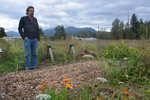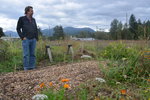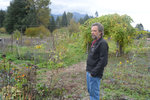



Steve Hoecker is the kind of guy who’s in his element battling wildfires in the backwoods of the national forest, delivering lines onstage at the Roxy Theater or going through a three-day vision quest in a Native American sweat lodge.
When people see that dynamic energy, that ease with people and place, he wants them to know it hasn’t come easily the past few years. In 2015, Hoecker was struck with a sledgehammer blow of grief when his wife Liz died from glioblastoma. Two years from his retirement with from the U.S. Forest Service, the couple had envisioned the time they’d spend together, traveling and spending time outdoors.
“That brought my life to a screeching halt,” Hoecker said “We did everything together. I hardly even went to town without her. We hiked at the same pace, picked mushrooms, huckleberries. When she passed away, I didn’t know who I was as an individual. I hadn’t been an individual in 31 years.”
Friends say the full-of-life Hoecker they’d known was gone for awhile, swallowed whole by the emptiness of his life without Liz. Hoecker’s story has lots of chapters of accomplishment and experience, but the most recent ones are about endurance and learning.
“He has been unbelievably open about his journey through losing Liz,” said Lynn Schinnell, a former Forest Service colleague of Hoecker’s and a longtime hiking buddy with Liz. “So many people have grown from what he’s shared and learned from what he’s shared. I’m proud of the way Steve has been processing his grief and has also continued living. He continues to teach us through that.”
Hoecker has yet to journey through grief, he says. For the rest of his life, he’ll be journeying with it — but he’s learned how to keep moving, to continue a winding life path that he’s largely “fallen into” and thrived.
Born in Illinois, Hoecker spent his childhood in the flatlands of the Midwest. The summer after his high school graduation, he attended a 4-H forestry camp and was surprised to find himself surrounded with kids who loved the outdoors as much as he did.
“I dreamed of the mountains,” he said. “I read every book I could get on Pony Express and mountain men.”
After a two years studying in a forestry technician program, he found his prospects limited; his only offer was a job stapling whiskey staves together. Things changed when he came home one day. “Idaho called,” his mom said, and a couple weeks later, he was on a plane for the first time, bound for the Clearwater National Forest.
For the next 10 summers, he lived in a Forest Service work center an hour and a half from the nearest town, where he came to embrace the rugged life of forest work and where he met Liz, then a member of the Student Conservation Association.
In 1989, Hoecker took a job as a timber cruiser in the Gifford Pinchot National Forest, trekking the backcountry to take inventories of the timber on the forest lands. He and Liz moved to Randle. After the Northwest Forest Plan curtailed much of the agency’s timber harvesting, Hoecker began to take on some responsibilities in the recreation program, a role that had been recently vacated by Schinnell.
After years in the wilderness, he found himself tasked with overseeing the newly created Discovery Team, a program that provided summer jobs for East County high school students doing work for the Forest Service.
“When you’re in timber, you’re out in the woods chewing Copenhagen and having a good old time,” Hoecker said. “All of a sudden, I’m at school. I’m thinking, ‘What have I done?’ There’s a bit of fear and trepidation.”
It turned out OK, as Hoecker helped turn the program into an award-winning venture that’s still running today. Debbie Layman, the program coordinator with the White Pass School District, said Hoecker made things easy, taking care of paperwork, lining up grants and providing safety instruction. He formed a bond with the students, performing an infamous Safety Rap that became a hit each year.
“He would come over, introduce himself, be crazy, play his guitar, have fun with the kids,” Layman said. “He wanted a relationship with those kids. We built such fun traditions.”
While Hoecker did everything from supervising students to battling wildfires, he and Liz were also getting involved in the United Methodist Church. Hoecker describes himself as a “spiritual seeker,” and the pair found themselves gravitating toward Cowlitz Tribe spiritual leader Roy Wilson, who held regular meetings at the church to teach Native American Medicine Wheel spiritual practices.
“Grandfather,” as Wilson is known, taught Hoecker about his birth totem, the elk, which calls out against injustice. He learned about his connection to the natural world. Together, he and Liz went through a vision quest, where they stayed in a sweat lodge for three days without food.
“You continue to learn things the rest of your life from that experience,” Hoecker said. “One of the greatest things I learned was how long a day really is. When you’re laying there watching the sun come up and waiting for it to go down, it’s a long time. But every day is that long. I realized it’s how you choose to fill up your days.”
That spiritual foundation — the belief, on whatever terms, that there’s “something larger than me” — proved important when Liz was diagnosed with aggressive brain cancer in 2014. After nearly a year of radiation and chemotherapy, she died in April of 2015. Since then, Hoecker said, he’s learned how ill-prepared our society is to deal with grief.
“It doesn’t go away in a month or a year or two years,” he said. “The greatest thing I can tell people is all you can really do for someone who’s experiencing deep grief is to hold them in their brokenness. You can’t fix them, so don’t try to. You can’t talk them into being better. You just have to hold them where they are.”
Amid a life that felt broken, Hoecker slowly started to find lifelines. He became a leader in the fight to save Hank, a dog that had been secretly adopted out by the county under a different name after “Tank” was deemed dangerous and slated to be euthanized. After a long legal battle, a judge ruled that dog could return to the family that had adopted him instead of being put down.
“That was the first thing that I cared about after Liz died,” he said.
Meanwhile, a friend convinced him to try out for a play at the Roxy Theater, “Arsenic and Old Lace.” He initially had a tiny role in the play, but when another actor dropped out, he added a second, bigger role that he found even more rewarding.
“We were just amazed. He’d never been in a show before,” said Fred Schwindt, who acted in that play and has produced and directed other plays Hoecker has acted in. “He did such a good job that people didn’t recognize that the two parts were the same actor. … He was real hesitant at first, but boy did he take to it.”
Hoecker said acting proved to be an important outlet for a number of reasons.
“Those dark nights of that first winter alone, I spent a lot of nights going to Morton to practice,” he said. “I met a bunch of people that didn’t know Liz. You don’t just lose the person, you can lose other relationships in your life. It’s hard for them to see you hurt. To get out there and meet people who didn’t know us, it gives you a new sense of identity.”
About the time that Liz died, Mossyrock resident Glenn Cowles was dealing with the recent loss of his wife and son. The two met and discovered a mutual love of music. They began playing together on Sunday nights.
“I started keeping in contact with him, calling him up and sharing grief together,” Cowles said. “It was a hard time. … When something like that happens and people want to comfort you, they look at you and go, ‘How you doing?’ Do you really wanna know? It’s helped me to care about him, because I know how much it hurts.”
Cowles plays acoustic guitar, Hoecker usually plays mandolin and lead guitarist Kent Raible rounds out their band the Stationary Stones, a play on the name Mossyrock. The trio is slated for perform on Oct. 23 at the Roxy to benefit Centralia College East’s GED program.
“Music has been a big part of my life,” Hoecker said. “It’s allowed me to express myself and my emotions. Whatever mood I’m in when I pick up an instrument, I’m usually in a better mood when I put it down.”
Both Hoecker and Cowles have processed their grief through songwriting. “Another Day in Hell” is Hoecker’s song about the depths of grief. Cowles’ “Mostly Good S--- Happens to Me” seeks optimism amid loss.
After Liz died, Hoecker still had two years left with the Forest Service. Layman urged him to stay involved with Discovery Team, even though his heart wasn’t in it.
“Everybody grieves differently,” she said. “So many people expected him to be done: ‘You shouldn’t be grieving this long.’ It hurt him so bad. I think Discovery Team was good for him. … I saw life starting to come back for him. He’s a whole different person now.”
Hoecker knows his journey isn’t done. Now retired, the 57-year-old said he sometimes struggles to fill his days, even with all the activities he’s involved in. In February, he found a new romantic interest, and he knows he has Liz’s blessing to keep living. Multiple friends, unprompted, voiced their approval of Hoecker’s new partner, and Cowles said he’s been “tickled” to watch that develop, having recently gotten involved with a new woman himself.
“The world keeps turning,” Cowles said.
Even now, Hoecker says he’ll always have to live with loss, but he’s determined to remain engaged with what he’s doing and help others learn from his experience.
“That’s one of the things I’ve learned about grief,” Hoecker said. “When it’s got you, it’s got you. It’s like this shadow that can just reach up and grab you. Now, I just say, ‘OK, I’m grieving.’ For 10 minutes, an hour, all day, whatever it takes. Before, I used to try to run from that.”